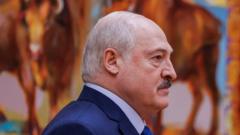With Alexander Lukashenko poised to secure a seventh term as president, a combination of voter apathy and fear of political instability clouds the upcoming elections. Opposition figures are either imprisoned or exiled, leading to a consensus that this election is merely a formality in a climate where genuine democracy is absent.**
Belarusian Elections Loom: A Nation Resigned to Lukashenko's Rule**

Belarusian Elections Loom: A Nation Resigned to Lukashenko's Rule**
As Belarus gears up for the January 2025 presidential elections, a sense of inevitability surrounds the outcome as many citizens express indifference amid ongoing repression.**
As Belarus approaches its presidential elections in January 2025, the atmosphere could not feel less charged. Despite being a nation steeped in electoral history, the streets of Minsk remain devoid of the customary visuals associated with an impending vote—gone are the billboards, the vibrant campaign slogans, and the flutter of political fervor. Instead, the populace seems resigned, fully aware that Alexander Lukashenko, who has held the presidency since 1994 and has been described as "Europe's last dictator," is all but guaranteed to secure yet another term.
Conversations with ordinary Belarusians reveal a noticeable indifference towards the electoral process. Driving around the capital, the few messages advocating for voting seem muted and lack the energy typically associated with democratic engagement. Lukashenko himself has downplayed the significance of the impending elections, telling workers at the Minsk Automobile Plant that he is too immersed in his responsibilities to even follow the campaign closely. The gift of a wood-chopping axe he received from the plant workers elicited laughter, contrasting sharply with the unresolved tensions surrounding recent political history.
The elections of 2020, where Lukashenko claimed an improbable 80% of the vote, ended in widespread unrest, leading to large-scale protests against alleged electoral fraud. In response, a violent crackdown ensued, resulting in thousands of arrests and the suppression of dissenting voices. As Belarusian opposition leaders languish in prison or face exile, the legitimacy of the upcoming election has come into question. The European Parliament recently condemned the electoral environment as a "sham" molded by severe repression, underscoring the lack of conditions for democratic elections.
Although there are five candidates officially competing against Lukashenko, their presence is little more than shallow theater. One of them, Sergei Syrankov, leader of the Communist Party of Belarus, perplexingly supports Lukashenko, stating that his campaign exists in conjunction with the incumbent's. The same notion arises from Oleg Gaidukevich of the Liberal-Democratic Party, who openly acknowledges that Lukashenko's victory is a foregone conclusion.
As conversations with the citizens unfold, their sentiments reveal a deeper fear of instability. Many express worries about the prospect of a new leader bringing chaos—reflecting on the turbulent situation in Ukraine. Residents in the town of Oktyabrskaya share a longing for stability, preferring the known quantities of Lukashenko’s rule, even if it means enduring an undemocratic environment.
Ultimately, while Lukashenko may face dissent behind closed doors, the prevailing atmosphere is marked by an unsettling blend of acceptance and trepidation—a backdrop that seemingly plays into his favor, describing a nation that is reluctantly inured to its political fate.





















